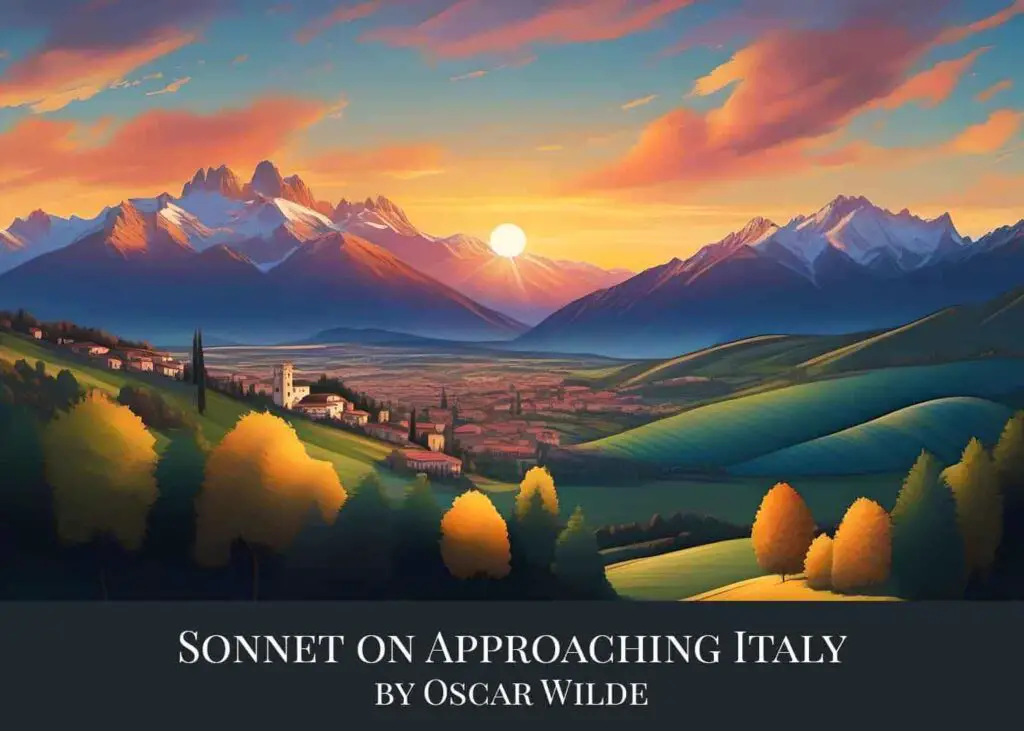
Sonnet on Approaching Italy by Oscar Wilde
“Sonnet on Approaching Italy” is a captivating poem by renowned poet and playwright Oscar Wilde, offering readers a lyrical exploration of the charm and essence of Italy. This sonnet, like many of Wilde’s poetic masterpieces, demonstrates his unique perspective and deep admiration for beauty and culture. It is a part of Wilde’s first poetry collection Poems. For those interested in diving deeper into Wilde’s poetic realm, Poems online book is available at PageVio.
1. The Poem
I reached the Alps: the soul within me burned,
Italia, my Italia, at thy name:
And when from out the mountain’s heart I came
And saw the land for which my life had yearned,
I laughed as one who some great prize had earned:
And musing on the marvel of thy fame
I watched the day, till marked with wounds of flame
The turquoise sky to burnished gold was turned.
The pine-trees waved as waves a woman’s hair,
And in the orchards every twining spray
Was breaking into flakes of blossoming foam:
But when I knew that far away at Rome
In evil bonds a second Peter lay,
I wept to see the land so very fair.
TURIN

Download Sonnet on Approaching Italy Poster
Size: 8″ x 12″ (2:3 ratio)
Format: PDF
Copyright information: For personal use only
Note: Actual poster background color is white. For the sample poster, the background is made gray for illustration purpose.
2. Sonnet on Approaching Italy Analysis
This poem narrates a traveler’s emotional journey upon reaching the Alps and seeing Italy (referred to as “Italia”). Let’s break down the poem to understand its meaning and the emotions it conveys:
“I reached the Alps: the soul within me burned,
Italia, my Italia, at thy name:”
The poem starts with the speaker reaching the Alps, a majestic mountain range in Europe. Upon seeing the sight of the Alps and Italy beyond them, the poet is overwhelmed with emotion – his soul “burns” with passion and longing for Italy. Italy is personified and addressed directly as “my Italia,” emphasizing a personal and deep connection to the country.
“And when from out the mountain’s heart I came
And saw the land for which my life had yearned,”
Emerging from the mountains, the poet witnesses the beautiful landscape of Italy – a land he has longed for.
“I laughed as one who some great prize had earned:”
The sight of Italy makes the poet ecstatic, and he compares his feelings to someone who has won a great reward. The view is his prize.
“And musing on the marvel of thy fame
I watched the day, till marked with wounds of flame
The turquoise sky to burnished gold was turned.”
The speaker reflects on Italy’s historical and cultural significance (“the marvel of thy fame”). He observes the changing sky, with the setting sun casting fiery hues, turning the blue sky into a golden spectacle. This transformation mirrors his emotions – passion, awe, and contemplation.
“The pine-trees waved as waves a woman’s hair,
And in the orchards every twining spray
Was breaking into flakes of blossoming foam:”
Nature is personified here. The movement of the pine trees is compared to a woman’s flowing hair, suggesting grace and beauty. The orchards with blossoming flowers evoke an image of foam breaking on the shores, highlighting the abundant beauty of the Italian landscape.
“But when I knew that far away at Rome
In evil bonds a second Peter lay,
I wept to see the land so very fair.”
The poem takes a sudden turn with a reference to a “second Peter” in “evil bonds” at Rome. Historically, Peter refers to Saint Peter, one of Jesus’ disciples who was imprisoned and crucified in Rome. “A second Peter” might suggest another person or figure undergoing persecution or suffering in Rome. This realization brings sorrow to the speaker. Despite the country’s undeniable beauty, it’s marred by the suffering of an individual, and this contrast makes the speaker weep.
“TURIN”
Turin, a city in northern Italy, is mentioned, possibly indicating the location where the poet composed the poem or a significant place in relation to the poem’s themes.
In essence, the poem paints a vivid picture of Italy’s stunning beauty while also contrasting it with a darker element of suffering. It captures the duality of beauty and pain, and the deep emotional reactions such landscapes can invoke in a traveler.
3. Conclusion
If “Sonnet on Approaching Italy” has piqued your interest, explore our collection of Oscar Wilde’s poetry for more.




